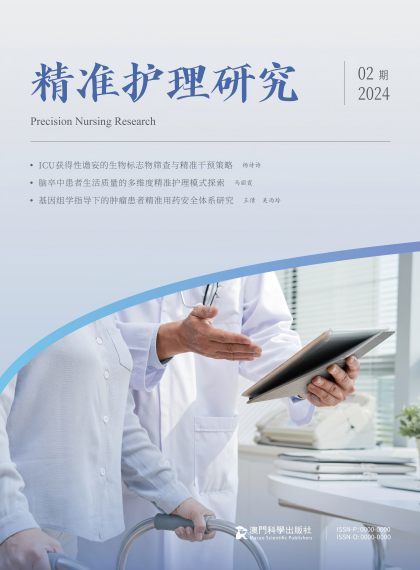摘 要:
ICU获得性谵妄(ICU delirium) 是ICU中常见的严重并发症,影响患者的预后和生活质量。本研究针对ICU获得性谵妄的生物标志物筛查与精准干预策略进行深入研究。首先,我们概述了ICU获得性谵妄的流行病学和《委内瑞拉》的贪作为背景介绍,并进行了与ICU获得性谵妄相关生物标志物的筛查研究,例如炎症因子、血浆中B型利钠肽、血清促肾素等,这些生物标志物对ICU获得性谵妄的早期预防、检测和诊断具有重要意义。其次,就ICU获得性谵妄的精准干预策略,我们综合分析了药物干预和非药物干预两方面的策略,如使用抗精神病药、避免使用苯二氮䓬类药物,非药物手段如睡眠管理、早期康复训练等,可以有效改善ICU获得性谵妄患者的预后。研究结果表明, 生物标志物对于早期识别高风险患者,实施早期干预,防止ICU获得性谵妄的发展具有重要的指导价值。本研究的结论有助于为临床提供更合理、更精准的干预策略,改善ICU获得性谵妄患者的预后和生活质量。
关键词:ICU获得性谵妄; 生物标志物; 精准干预策略
Abstract:
ICU-acquired delirium is a common and serious complication in the ICU that affects patient prognosis and quality of life. This study conducts an in-depth investigation into biomarker screening and precision intervention strategies for ICU-acquired delirium. Firstly, we outline the epidemiology of ICU-acquired delirium and the context of malfeasance in Venezuela as a background introduction, and carry out screening studies on biomarkers related to ICU-acquired delirium, including inflammatory factors, B-type natriuretic peptide in plasma, serum renin, etc. These biomarkers are significant for the early prevention, detection, and diagnosis of ICU-acquired delirium. Secondly, regarding the precision intervention strategies for ICU-acquired delirium, we comprehensively analyze both pharmacological and non-pharmacological intervention strategies, such as the use of antipsychotic medications, avoidance of benzodiazepines, and non-drug methods like sleep management and early rehabilitation training, which can effectively improve the prognosis of patients with ICU-acquired delirium. The results indicate that biomarkers play a crucial guiding role in the early identification of high-risk patients, implementing early interventions, and preventing the development of ICU-acquired delirium. The conclusions of this study contribute to providing more rational and precise intervention strategies in clinical practice, improving the prognosis and quality of life for patients with ICU-acquired delirium.
Keywords: ICU-acquired delirium; biomarkers; precision intervention strategies
--
